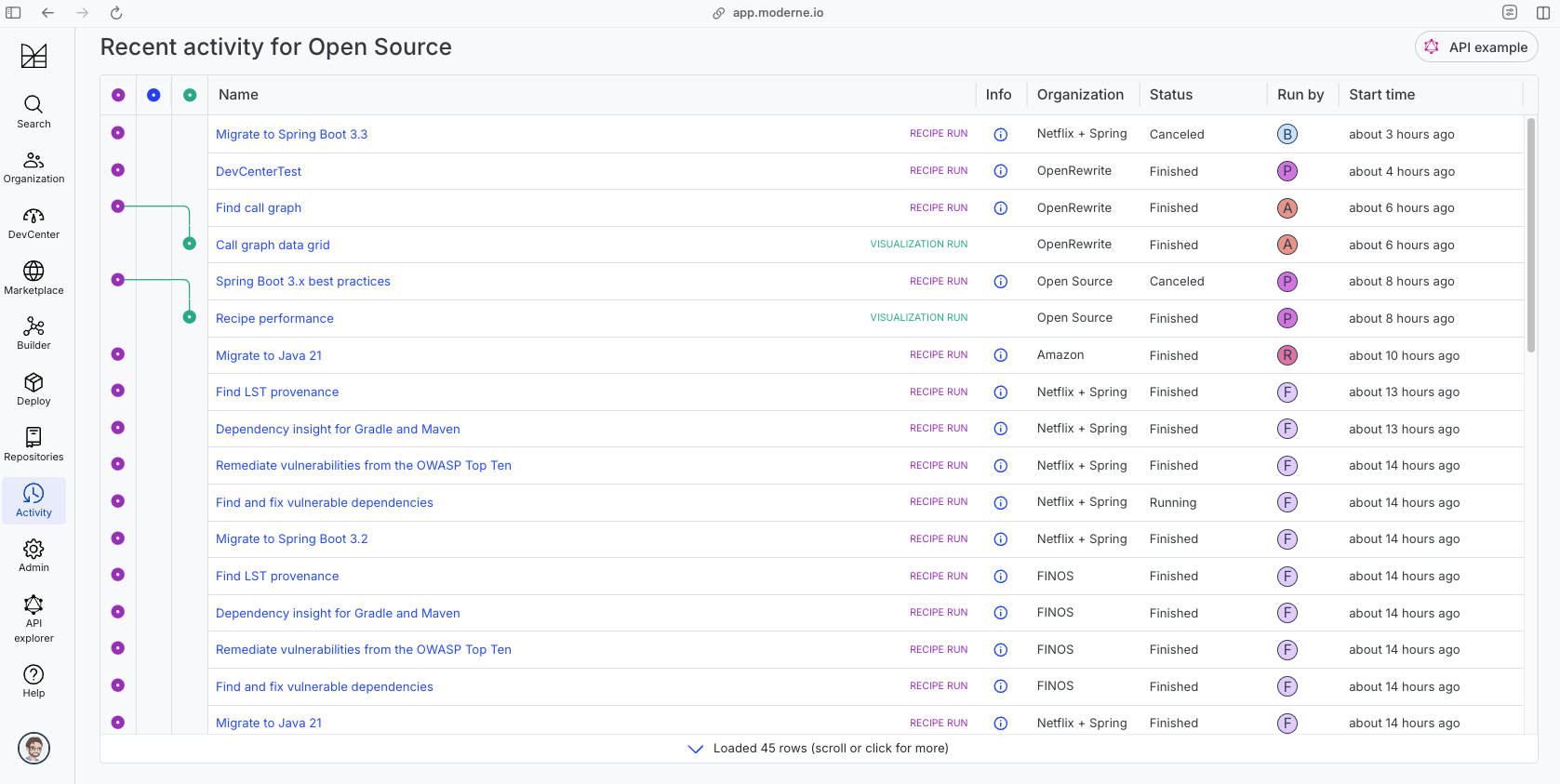Migrate deprecated methods with @InlineMe
Google's Error Prone library introduced the @InlineMe annotation to help with API migrations. When a method is deprecated and marked with @InlineMe, it provides precise instructions on how to replace calls to that method. OpenRewrite can now automatically apply these inline replacements across your codebase.
What is the @InlineMe annotation?
The @InlineMe annotation is a powerful tool for API authors to communicate exactly how deprecated methods should be replaced. It includes:
- A
replacementstring showing the new code pattern - Optional
importsandstaticImportsfields for any new imports needed - Support for parameter reordering and transformations
This is particularly useful when:
- Method signatures change (e.g., parameter order)
- Methods move to different classes
- Multiple methods are consolidated into one with different parameters
Example Configuration
To run the InlineMethodCalls recipe that automatically applies these migrations:
- Gradle
- Maven
plugins {
id("java")
id("org.openrewrite.rewrite") version("7.13.0")
}
rewrite {
activeRecipe("org.openrewrite.java.migrate.InlineMethodCalls")
}
repositories {
mavenCentral()
}
dependencies {
rewrite(platform("org.openrewrite.recipe:rewrite-recipe-bom:latest.release"))
rewrite("org.openrewrite.recipe:rewrite-migrate-java")
// Other project dependencies
}
<build>
<plugins>
<plugin>
<groupId>org.openrewrite.maven</groupId>
<artifactId>rewrite-maven-plugin</artifactId>
<version>6.16.0</version>
<configuration>
<activeRecipes>
<recipe>org.openrewrite.java.migrate.InlineMethodCalls</recipe>
</activeRecipes>
</configuration>
<dependencies>
<dependency>
<groupId>org.openrewrite.recipe</groupId>
<artifactId>rewrite-migrate-java</artifactId>
<version>{{VERSION_REWRITE_MIGRATE_JAVA}}</version>
</dependency>
</dependencies>
</plugin>
</plugins>
</build>
How it works
When you run this recipe, OpenRewrite will:
- Scan for @InlineMe annotations to find all deprecated methods that have migration instructions
- Locate all usages of these deprecated methods throughout your codebase
- Apply the replacements automatically, rewriting each call according to the pattern specified in the annotation
- Update imports by adding any newly required imports and removing ones that are no longer needed
Real-world example: Google's S2 Geometry Library
Here's an example from Google's S2 Geometry library showing how @InlineMe helps migrate deprecated APIs:
Deprecated method with @InlineMe
@Deprecated
@InlineMe(
replacement = "S2EdgeUtil.getPointOnLine(a, b, ax)",
imports = "com.google.common.geometry.S2EdgeUtil")
public static S2Point interpolateAtDistance(S1Angle ax, S2Point a, S2Point b) {
return getPointOnLine(a, b, ax);
}
@Deprecated
@InlineMe(
replacement = "S2EdgeUtil.interpolate(a, b, t)",
imports = "com.google.common.geometry.S2EdgeUtil")
public static S2Point interpolate(double t, S2Point a, S2Point b) {
return interpolate(a, b, t);
}
Before and After migration
- Before
- After
import com.google.common.geometry.*;
public class S2ConvexHullQuery {
public S2Loop createLoop(S2Point a, S2Point b) {
// Note the parameter order: t comes first
S2Loop loop = new S2Loop(ImmutableList.of(
a,
b,
S2EdgeUtil.interpolate(0.5, a, b)
));
loop.normalize();
return loop;
}
}
import com.google.common.geometry.*;
public class S2ConvexHullQuery {
public S2Loop createLoop(S2Point a, S2Point b) {
// Parameters have been reordered: a, b, then t
S2Loop loop = new S2Loop(ImmutableList.of(
a,
b,
S2EdgeUtil.interpolate(a, b, 0.5)
));
loop.normalize();
return loop;
}
}
Notice how the recipe automatically:
- Reordered the parameters from
(t, a, b)to(a, b, t) - Preserved the exact value
0.5in its new position - Kept all other code unchanged
More examples from the change
- Method rename
- Complex parameter reordering
- if (tmp.isEndpoint(p) && !visitor.test(shapeId, edgeId, tmp.a, tmp.b)) {
+ if (tmp.hasEndpoint(p) && !visitor.test(shapeId, edgeId, tmp.a, tmp.b)) {
The isEndpoint method was renamed to hasEndpoint - a simple rename that's perfectly handled by @InlineMe.
- S2Point midpoint = S2EdgeUtil.interpolateAtDistance(S1Angle.radians(0.5), start, end);
+ S2Point midpoint = S2EdgeUtil.getPointOnLine(start, end, S1Angle.radians(0.5));
Here the method name changed and parameters were reordered, with the angle moving from first to last position.
Creating your own @InlineMe migrations
If you're a library author, you can use @InlineMe in your own APIs:
@Deprecated
@InlineMe(
replacement = "this.newMethod(param2, param1)", // Swap parameter order
imports = {}) // No new imports needed
public void oldMethod(String param1, int param2) {
newMethod(param2, param1);
}
public void newMethod(int number, String text) {
// New implementation
}
Running the recipe
Execute the migration with:
- Gradle:
./gradlew rewriteRun - Maven:
mvn rewrite:run
After running, review the changes with git diff to see all the automated replacements.
See how this recipe works across multiple open-source repositories
Run this recipe on OSS repos at scale with the Moderne SaaS.

The community edition of the Moderne platform enables you to easily run recipes across thousands of open-source repositories.
Please contact Moderne for more information about safely running the recipes on your own codebase in a private SaaS.